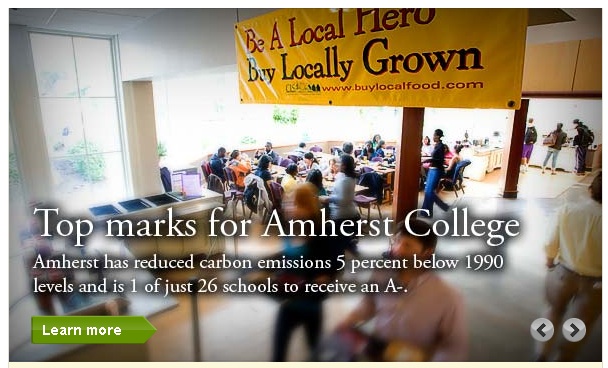No longer are students basing their university choices on reputation alone. Green credentials have become a new part of the criteria students evaluate when deciding on where to continue their education. The Princeton Review has for years helped students in North America ‘shop’ for the best universities based on a long list of factors. Now, the Princeton Review has incorporated a Green Colleges ranking assigned to schools based on their environmental policies and academic offerings.
New on the scene as well is the College Sustainability Report Card. The report card provides sustainability information for hundreds of colleges and universities across Canada and the United States based on 48 indicators, such as Green purchasing, energy efficiency, use of renewables on campus and presence of locally and organically produced food. One of the most interesting things about the report card is academic offerings is not one of the indicators. Schools are judged based on their performance and innovation in the sector.
The best ranked colleges include Amherst College, Brown University, Arizona State University- Tempe and the University of California- Davis.
It’s fascinating to see an increasing proportion of prospective students being influenced by, and actively seeking out colleges with better environmental reputations. Some schools work hard to brand themselves as sustainable, such as Colorado State University, which has self-assigned itself the title ‘The Green University’. Market differentiation, by way of green credentials seems to be a major and really good shift for colleges and universities, far beyond a green-washed marketing or activities, but evaluated rigorously by external sources.

Katherine Hui is currently the Social site editor at Green Thing, a web-based public service in London that inspires people to lead greener lives through creative content.
Before this, she worked as the Development Manager at Social Innovation Camp, an organization that encourages people to use web and mobile-based technology to mobilise social change. She oversaw 300 ideas submission and helped build 20 prototypes – five of which have gone on to get further funding or investment.
Katherine’s came over to the UK form Canada in 2007 for an MSc program at the London School of Economics. Before arriving in London, she managed a small environmental start-up in Vancouver called the Canadian Climate Change Alliance.
Katherine is football mad. She is a loyal supporter of Arsenal FC, plays for Islington Borough Ladies FC and coaches for Gunners in Islington in her spare time. Her second favourite hobby is kite surfing and she can sometimes be found chasing the wind.










